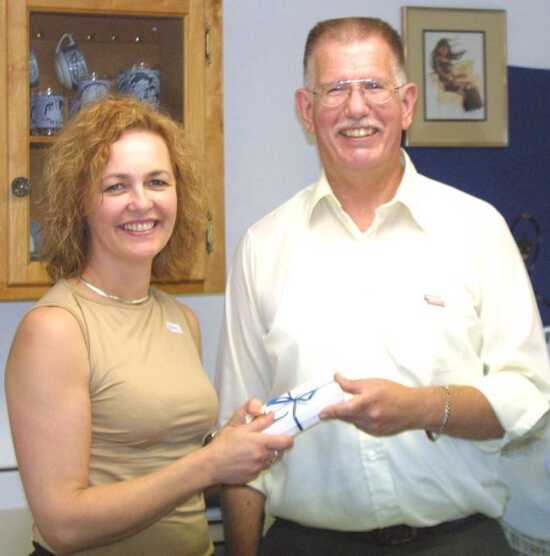Australian perspective -- Network hears ideas from down under

WELLFLEET -- The Beaver City man who chairs the southwest chapter of the Nebraska Development Network told an Australian farmer that his organization would gladly share its community development secrets if she would let the group use her "COW" acronym.
Jenny Grigg of Patchewollock, Victoria, Australia, sat in on an NDN meeting at the Dancing Leaf Learning Center at Wellfleet Thursday, and told the group about her region's "Community Opportunity Workshops" ("COW").
Jenny laughed, "We became known as 'the ol' COWS'."
"Have fun with it," Jenny told NDN chairman Jay Hall. "But," she warned, with a tilt of her head and an ear-to-ear grin, "It will come back to haunt you."
Jenny farms with her husband, Paul, their children, and Paul's family near Patchewollock, Victoria, Australia.
Jenny said her family grows wheat, barley, triticale, and sometimes canola, in the Mallee Region of Northwest Victoria. "Canola is a gorgeous, gorgeous yellow, especially against the stormy skies," Jenny said, "but it's hit-and-miss with the weather."
"It's a very fine seed that can be blown right out of the ground," she explained.
"It's all gambling anyway, farming is, isn't it?," she sighed, smiling.
Jenny studied economics and politics at Melbourne University. Following her marriage 25 years ago, she became involved in agri-politics and women's roles in the grain industry.
She is the director of Wimmera Mallee Water, a water authority that distributes water through pipes and channels to a large part of the state.
For the past three years, Jenny has worked with the State Government of Victoria as facilitator of the NWMallee "Community Capacity Building Initiative," working with 10 communities in community planning and development, organizing learning workshops (COW) and supporting community projects.
During her research into community development and community capacity building, Jenny said, she realized the potential for successful community development using the business structure of a cooperative. (A cooperative is a business or enterprise that is owned by and operated for the benefit of those using its services, such as an agriculture or housing cooperative.)
Jenny believes cooperatives can certainly help communities. In one case, she said, a cooperative purchased and is now successfully running a shop that was closing its doors.
Another community formed a cooperative to hire an engineer, filling a need for the community and creating a job opportunity.
"I can see how the business structure of a cooperative could be used extremely well in communities," Jenny said, "to sustain, maintain or bring in services. It's a fairly logical step to take."
On a Winston Churchill Fellowship, Jenny is visiting the United States, Canada and Ireland -- three countries she describes as front-runners in community development.
"Yes," Jenny admitted, smiling. "I'm here to steal your ideas, and your creativity."
